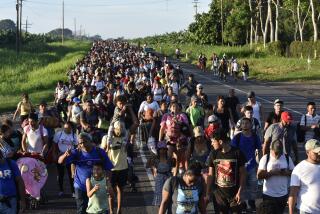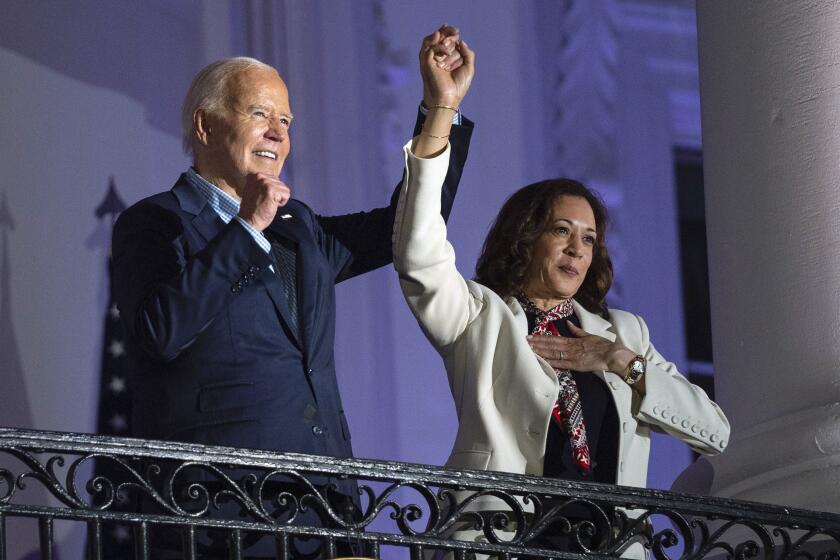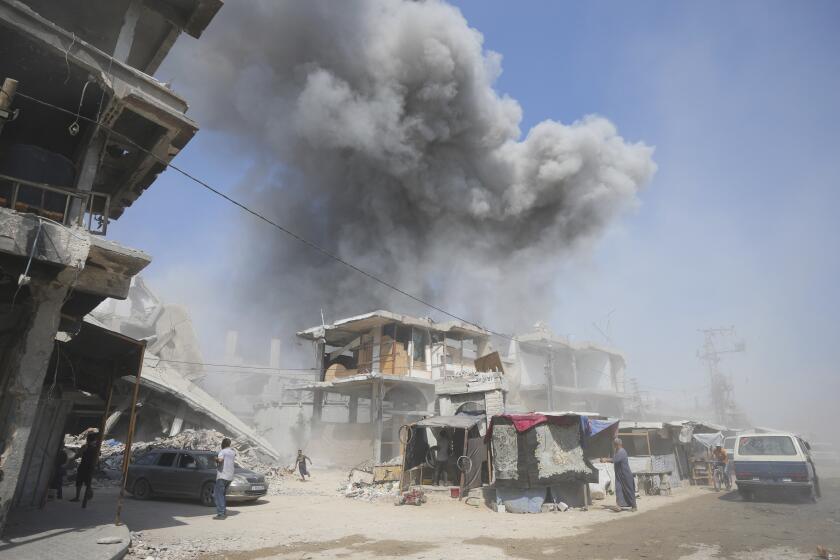Vietnam War Leaves Legacy of Anguish : Still Overshadows Lives, U.S. Policies
It was April 29, 1975--perhaps the most humiliating day in American history--when the last handful of U.S. diplomats clambered out onto the roof of the U.S. Embassy in Saigon and fled aboard waiting helicopters. Marine guards used rifle butts to beat aside Vietnamese who clutched in panic at the departing aircraft.
The following morning, North Vietnamese tanks rolled onto the grounds of the Presidential Palace, the home of South Vietnamese President Nguyen Van Thieu, who had resigned only days before. The Vietnam War was over.
Ten years later, although time has already carried Vietnam into the mists of history for millions of younger Americans, the nation as a whole still struggles with the tangled legacy of the longest war the United States ever fought and the first war it ever lost.
Source of Polarization
Like the turbulent era itself, the aftermath of Vietnam is both an epic of personal sacrifice, courage and pain, and an unrelenting battle over the shape and direction of U.S. policy in the world. If part of the war’s legacy lies submerged in millions of anonymous private lives, it is inescapably pervasive among those responsible for shaping U.S. policy and tactics in the post-Vietnam era.
In the White House, at the Pentagon, throughout the State Department and in the halls of Congress, the Vietnam War remains a source of polarization and bitterness--with partisans all across the political spectrum passionately disagreeing on the war’s meaning but concerned that it will be pushed out of the nation’s collective mind and its lessons lost.
“Forty years ago, we won the war in Europe--we never will forget that. Most of us will forget as fast as we can the outcome of our failure to support an ally in Vietnam,” said retired Gen. Maxwell D. Taylor, chairman of the Joint Chiefs of Staff in the early days of the Vietnam War and later ambassador to Saigon, as well as a combat commander in World War II.
Bob Muller, a former infantry officer paralyzed from the chest down by his Vietnam wounds, also fears that Americans may succumb to selective forgetfulness, but his perspective is vastly different from Taylor’s.
“Nobody likes to live with the pain of a really bad incident,” said Muller, president of the Vietnam Veterans of America. “We as a society are cleaning up our Vietnam experience to make it more palatable.”
Cites Chief Mistake
That, he fears, may blur what he considers the chief mistake of the conflict--getting involved militarily in a country where U.S. interests were not paramount.
“Fifty-eight thousand Americans killed, who knows how many lives affected . . . . Once you pay that kind of price, if you can’t muster the moral courage to ask how did it happen, why did it happen, you are in danger of going down the same road again,” Muller said.
For those who bore the immediate burdens of the war, such forgetfulness is not possible. For them, it is an inescapable reality of daily life:
--More than 58,000 Americans were killed, along with more than 1.5 million Vietnamese, leaving fathers and mothers, wives, husbands, sons, daughters and friends to go on as best they could.
--Of the 3.7 million Americans who served in the war zone during the approximately 15 years of direct U.S. military involvement, more than 300,000 came home wounded--with 11,000 Vietnam veterans still being treated in Veterans Administration facilities on an average day.
--For the families of the 2,477 servicemen still listed as missing in action, there is the special torment of limbo. Occasional reported sightings of Americans in the jungles of Indochina keep alive the hope that some MIAs may have survived and are being held captive, although the Pentagon says no sightings have been confirmed.
--Countless veterans still struggle with the emotional impact of war and their subsequent failure to receive the public recognition accorded fighting men in previous conflicts. As Defense Secretary Caspar W. Weinberger put it, “Veterans felt disgraced, rejected and troubled by unfair treatment they endured at home after fighting in Vietnam.”
--The approximately 735,000 people who fled life under the victorious Communists in Vietnam, Cambodia and Laos and found refuge here are providing this nation of immigrants with yet another infusion of dreams and determination but also are creating unaccustomed tensions wherever they settle. Some have been conspicuously successful--high school valedictorians and prosperous businessmen abound--but many others are still grappling with economic and emotional problems.
Attitudes Changing
If the legacy of Vietnam has predominantly been one of continued anguish and conflict, not peace and reconciliation, there are at last signs of some change in public attitudes.
A memorial in Washington--bearing the names of the 58,022 servicemen who died in Southeast Asia--provoked bitter controversy while under construction, but its dedication 2 1/2 years ago evoked an outpouring of emotion from both veterans and the public.
And along with that change in public attitudes has come help for at least some of the veterans damaged by the war--in continued support for government counseling services, in a $180-million trust fund to help those exposed to the Agent Orange defoliant and in less hostility toward veterans as a whole.
“The public has dramatically changed in its attitude toward the Vietnam veteran,” said Vietnam Veterans leader Muller. “There is finally a sense of appreciation.”
But there is still not the same respect that was accorded to veterans of previous wars. After World War II, for example, Gen. Dwight D. Eisenhower, the Allied commander in Europe, was elected President in his first try for public office, and every President since then except Jimmy Carter (who during the war was an Annapolis midshipman) has been a World War II veteran.
The Vietnam conflict, by contrast, has not provided a political springboard. Only about 30 of the 535 members of the Senate and House are Vietnam veterans, and when David Christian, possibly the most decorated soldier of the war, ran for Congress from a suburban Pennsylvania district last year, his Republican advisers told him to soft-pedal his military experience. He was narrowly defeated.
What Were the Lessons?
Christian, now 36, is bitter about the advice he received, in part because he believes he could have won if he had been allowed to be himself but, more important, because he does not like what the political strategy says about the nation’s opinion of its fighting men. “It wasn’t good to be a war hero,” he said.
Beyond such personal impact, Vietnam continues a decade later to wield a far-reaching--albeit unresolved--influence on U.S. foreign and national security policy.
All sides agree that there must be “no more Vietnams,” but the disagreements about how to avoid another such quagmire remain as sharp as when the fighting raged. And, while the “lessons of Vietnam” are endlessly invoked in debates over defense and foreign policy, there is little consensus on what those lessons are.
At one extreme are those who argue that the nation must never again blunder into war in the Third World. As a corollary, they say the United States must avoid the arrogance of the early 1960s, what they see as the widespread belief that all the world’s problems could be solved by sufficient application of American power and will.
“The American people and Congress now appreciate that we are neither omniscient nor omnipotent, and they are not prepared to commit U.S. troops to combat unless there is a clear U.S. national security interest involved,” said Rep. John S. McCain (R-Ariz.), a former Navy flier who spent six years in a North Vietnamese prison camp.
“If we do become involved in combat, that involvement must be of relatively short duration and must be readily explained to the man in the street in one or two sentences,” he said.
At the other extreme are those who argue that the United States went wrong in Vietnam not because it got involved but because it lost. The nation, in this view, must be prepared to intervene in the Third World whenever its national interests are at stake--and to use enough power to win and to win quickly.
Wartime Footing Necessary
To prevent a resurgence of anti-war sentiment in a future war, this camp argues, the civilian population must be put on a wartime footing before sending troops into combat and curbs must be placed on the kind of unrestricted television coverage that fueled anti-war sentiment by bringing Vietnam into the nation’s living rooms.
President Reagan and his colleagues clearly prefer this “no substitute for victory” interpretation of the lessons of Vietnam.
“When it is necessary to commit troops to combat, we must do so in sufficient strength and with sufficient resolve to win,” Weinberger said. “A major lesson the U.S. learned in Vietnam was that we should never again send our troops into combat unless we are committed totally. So, while we are no more reluctant to use force when force is necessary, I hope we are a bit wiser about the (amount of) force that is necessary.”
Piecemeal Involvement
The emphasis in both camps on making clearly delineated, publicly supported decisions about future use of military force reflects the near-universal consensus that part of the problem with Vietnam was the piecemeal way in which this country got involved.
Indeed, some historians date the beginning of U.S. involvement as far back as 1946, when the United States supported France in its effort to re-establish its Indochinese colony after World War II. Others note that it was in 1960 that the first U.S. military advisers were sent to Vietnam.
It was 1964 when Congress passed the Gulf of Tonkin Resolution authorizing increased U.S. military activity following a reported attack on two U.S. warships in the Gulf of Tonkin. And it was in 1965 that the first U.S. combat troops were sent in.
Since the war’s end, it has been widely assumed that the “no more Vietnams” syndrome has exerted such pressure on American policy-makers that it has become more difficult to intervene militarily abroad or even to make a show of U.S. force.
Yet the evidence on that point is mixed. Only a year after the fall of Saigon, U.S. troops fought and some died to free the crew of the freighter Mayaguez from an island off the coast of Cambodia.
Since then, the United States also has used military force in the desert of Iran, in Lebanon and in Grenada. The Vietnam experience probably influenced each of those actions, foreign policy specialists say, but other factors seem to have been at least as important.
The only two cases in which the divergent lessons of Vietnam have been directly applied appear to have been Angola in 1976 and Grenada in 1983.
With Angola’s post-colonial war nearing its climax in 1976, then-President Gerald R. Ford attempted to aid the non-Marxist faction fighting for control in the former Portuguese colony in southwestern Africa. Congress, with the trauma of Vietnam still fresh, voted overwhelmingly to ban any sort of U.S. intervention.
It was an obvious application of the doves’ favorite lesson of Vietnam: Do not get involved in conflicts in the Third World.
Hawks’ Favorite Lesson
Seven years later, when the Marxist government of Grenada was overthrown by its own left wing, President Reagan seized the opportunity to smash Marxist control of the island. The invasion by Army paratroops and Marines quickly achieved its objective, ousting the rebel regime and setting the country on the road to democratic elections. It was an unmistakable application of the hawks’ favorite lesson of Vietnam--if you intervene in the Third World, make sure you win quickly and, if possible, do it with a minimum of news coverage.
Elsewhere, the situation is less clear-cut. U.S. policy toward Central America is commonly said to be shaped by the legacy of Vietnam. Because of congressional pressure, tight restrictions have been imposed on U.S. programs to help the non-Marxist government of El Salvador resist a leftist insurgency and to assist the non-Marxist rebels in Nicaragua in their effort to topple the country’s Marxist-led government.
In El Salvador, the Reagan Administration observes a self-imposed limit of 55 on the number of U.S. troops engaged at any one time in training units of the Salvadoran army. In Nicaragua, the Administration chose to provide covert aid--but no U.S. military advisers--to the contra insurgents. But even those efforts have been blocked since Congress cut off funding.
It is not at all certain, however, how many of these restrictions are the direct result of Vietnam and how many are caused by other factors.
Effect in Latin America
“Absent Vietnam, there would almost surely be a larger Army advisory mission in El Salvador,” said Harvard historian Ernest May. “Nicaragua is harder to assess because it is difficult to separate the results of Vietnam from the results of Watergate. Probably absent Watergate (and the investigation of intelligence activities which the scandal spawned), you would not have had the same sort of congressional scrutiny of covert activity and you wouldn’t have had the same restraints on the executive.”
May, considered an expert on the way government leaders’ views of the past influence their policy decisions, says even without the restraints of the Vietnam legacy, it is unlikely that the Reagan Administration would have sent U.S. troops into Nicaragua since that would clearly constitute an act of war against a recognized government.
He believes that the Administration would have done just about what it actually did--provide covert assistance to the contras. However, he says, if it had not been for the hangover from the Watergate scandal that drove President Richard M. Nixon from office, the covert program probably would have remained secret and would not have been interrupted by Congress.
Erosion of Confidence
Weinberger agrees that even without the memory of Vietnam, the President’s Central America policy would not have been very different. But he said the Administration has found it more difficult to pursue its policy because of an erosion of public confidence in the government that may have been caused by the Vietnam experience and its political fallout.
“Many people simply do not believe the government when we tell them what is going on in Nicaragua,” the defense secretary said. “Credibility is also associated with fear of escalating U.S. involvement in the region. This has produced reluctance by many in Congress to authorize sufficient military aid for El Salvador, out of fear that this may be the first step into a Vietnam-like involvement.”
Comments ex-POW and now-Congressman McCain: “I don’t think anyone sees sending U.S. troops to Nicaragua as a viable option. In 1962, I think lots of people would have seen it as viable.”
Can Go Too Far
Sen. John F. Kerry (D-Mass.), a decorated naval combat veteran of Vietnam who became a leader of the anti-war movement, says that without the inhibitions of Vietnam, the United States would have “a much more visible military presence” in Central America. But the Vietnam analogy can be carried too far, he says:
“Even as an anti-war veteran, I perceive enormous differences between Latin America and Vietnam. We do have important interests in the (Latin) area. The big issue is not the goals, as it was in Vietnam--it is how to achieve them. I have great respect for the American people’s ability to tell when this country’s interests are clearly at stake.”
When militant Shia Muslims seized the U.S. Embassy in Tehran in 1979, it provided another test of the Vietnam syndrome. It is easy to speculate that other Presidents might have used more force and used it sooner than Jimmy Carter did. But the former President said in a recent interview that Vietnam had nothing to do with his strategy for handling the hostage crisis.
“I never did feel the constraint of the so-called Vietnam syndrome because my own orientation was basically compatible with non-intervention, non-use of force whenever there was a reasonable alternative of negotiations or diplomacy,” Carter said.
Nevertheless, Carter made the most sweeping commitment of U.S. power since the early days of the Vietnam conflict when he announced that the United States would respond with military force to any attempt by the Soviet Union to interfere with the oil-producing regions of the Persian Gulf. The “Carter Doctrine” did not result in military action only because the Soviets did not choose to test it.
And then there has been Lebanon.
The U.S. military’s worst single day since the end of the Vietnam conflict was Oct. 23, 1983, when a suicide car bomber demolished the Marine barracks in Beirut, killing 241 American servicemen.
With a lightly armed force of 1,500 Marines sent into the middle of Lebanon’s seemingly interminable civil war without any clearly defined military objective, the conflict was almost a prototype of a Third World quagmire. The depths of historical animosity goading the Lebanese combatants was almost bottomless, and the U.S. force was far too small to have any chance of prevailing.
George W. Ball, who as under secretary of state from 1961 to 1966 was the most outspoken critic of Vietnam policy inside the government, recently wrote: “In engaging our Marines and the guns of our fleet to help (Lebanese President Amin) Gemayel conquer the dissident factions in his country, we were repeating with almost eerie fidelity our failed adventure in Vietnam. Just as earlier Presidents had done in Southeast Asia, President Reagan was once again committing America forces--and American prestige--to try to help a weak, narrowly based government . . . impose control on highly motivated rival factions.”
Rep. McCain’s generally conservative voting record and three-generation military background--both his father and grandfather were admirals--would seem to set him on the opposite side of any argument from the outspokenly liberal Ball. But he agrees that it was a mistake to commit U.S. forces in Beirut.
“I didn’t think that sending 1,500 Marines would make a difference” in the confused Lebanese political situation, he said.
However, even Reagan’s critics concede that he learned the lessons of military futility quickly. Less than four months after the bombing, the President redeployed the Marines to ships offshore, the first step toward total withdrawal.
It was a clear application of the post-Vietnam rule to win or get out. Realizing that there was no way to win, Reagan chose to get out.
In the final analysis, the one overriding lesson from Vietnam may be that it is often worse to learn the wrong thing from an experience than to learn nothing at all.
“The ideas that came out of the 1950s were tried out in Vietnam and failed,” said Maj. Gen. Perry Smith, a Columbia University Ph.D. who is president of the National War College in Washington. Scarred by the U.S. experience in Korea, he says, U.S. policy-makers insisted on a gradual approach to the war that would not threaten either the Soviets or the Chinese.
But the U.S. decision to escalate its use of power slowly always gave North Vietnam an opportunity to adjust. It was an impromptu strategy and had no chance of success, Smith believes.
“I don’t think anybody really thought through what the goals were and what means were available to achieve them,” Smith said. “Without clear goals, we should not have gone in there, and once there, we should have gotten out. One of the problems is many policy-makers are not students of history. They tend to look only at the last war or at their own experiences.”
If the legacy of Vietnam on foreign policy is difficult to measure with precision, the impact on the nation’s military establishment is clear. From 1965 to 1975, Vietnam dominated the military budget, draining away resources that could have been devoted to acquisition of modern weapons systems. Congress and the White House compounded the problem by cutting back Pentagon spending in the aftermath of the war.
Reagan’s controversial military budget increases are designed to fill the Vietnam gap in military force modernization.
Robert W. Komer, once one of the most outspoken advocates of U.S. policy in Vietnam when he served as a high-ranking civilian in Saigon, now says, “We had a decade of having our eye on the wrong ball.”
“The loss of Vietnamese real estate really didn’t make all that much difference as seen in retrospect,” Komer said. “But the Vietnam syndrome led to a precipitous decline in military spending. Vietnam cost us all the planes, tanks and ships that the Joint Chiefs complain we don’t have. If we had not intervened in Vietnam and had invested the $500 billion and 58,000 lives we would have saved into building up our deterrent capabilities elsewhere, we would probably be better off.”
Lawrence J. Korb, assistant secretary of defense for manpower, installations and logistics, is convinced that the impact of Vietnam on the military has been profound.
“The military up to the Vietnam War was a very respected institution in our society,” Korb said in an interview. “After Vietnam, the country turned its back on the military and foreign affairs in general for a decade.”
Public Support Vital
As a result of the war, he said, professional military men have concluded that the country must obtain public support in advance before committing U.S. troops. “We paid a high price for losing that support or not having it in the first place,” he said.
He said the war “ended conscription” and generated a heightened interest within the military in the ethics of warfare. Both of these results, he said, are good as long as the military is able to obtain enough voluntary recruits and as long as the introspection does not lead to paralysis.
Also, he said, “Vietnam drove the ROTC (Reserve Officers Training Corps) off a lot of the more elite colleges of the country. We don’t get as many of those people to be officers as we once did, although that is slowly getting better.”
In its efforts to sort out the lessons of the conflict, the military has adopted programs intended to train and deploy troops as members of units instead of as individuals, to avoid the one-year tours that were common in Vietnam. Supporters of these programs say they will improve morale and group cohesion.
Gen. Paul F. Gorman, who recently retired as the commander in chief of U.S. forces in Central America, offered an unusually candid critique of American capabilities to Congress two months ago. The Pentagon, he said, is still not prepared to fight a “low-intensity conflict,” which is how Vietnam began.
He said the military continues to neglect the kind of intelligence-gathering, communications, transport, medicine, logistics and foreign assistance required in a low-intensity conflict.
But Army Lt. Col. Jack Jacobs, a faculty member of the National War College, said in an interview that some middle-level officers in Vietnam who have since risen to senior positions may have developed some attitudes toward warfare in Vietnam that would not stand them in good stead in the event of a more conventional war, perhaps in Europe. As majors and lieutenant colonels, they were often farther removed from actual battle than their counterparts in the Korean War and World War II.
“We raised a whole generation of officers, many of whom are in high positions, whose experience in combat was minimal,” Jacobs said.
Some of the impact of Vietnam may be fading, some experts say. “I don’t think we will be completely over it in this century, but with each passing year, it becomes dimmer,” Korb said. “I think the support for the defense buildup shows that people accept the possibility of using military force.”
More to Read
Sign up for Essential California
The most important California stories and recommendations in your inbox every morning.
You may occasionally receive promotional content from the Los Angeles Times.






